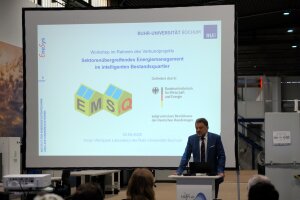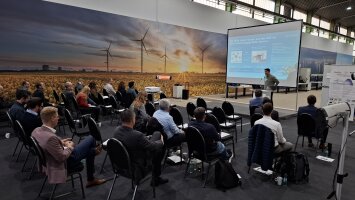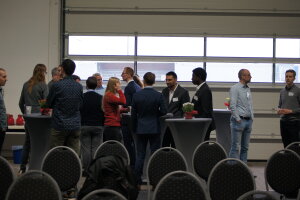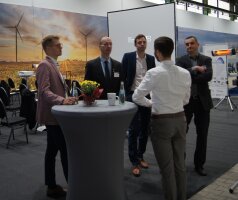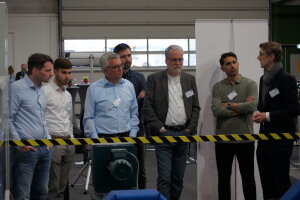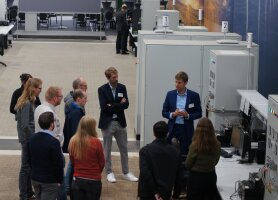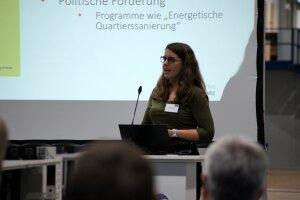
On 30 September 2025, a workshop was held at the SWiPLab as part of the EMSiQ joint project. A brief report on the workshop can be found here.
On 30 September 2025, a networking and transfer workshop was held at the Smart Windpark Laboratory (SWiPLab) of the Institute for Power Systems Technology and Power Mechatronics (EneSys) at Ruhr University Bochum. It was part of the project “Cross-sector energy management in smart existing neighbourhoods (EMSiQ)” funded by the Federal Ministry for Economic Affairs and Energy. The aim of the project is to retrofit inefficient existing residential neighbourhoods with a sustainable, decentralised infrastructure for electrical energy, heat and mobility. To this end, an innovative neighbourhood supply system with a novel energy management system and corresponding business models is being developed and implemented in a demonstration neighbourhood by the project partner Vonovia. Representatives from research, the housing industry, local authorities, industry and politics were invited to listen to and discuss expert presentations on these topics.
After a welcome by project coordinator and institute director Prof. Dr.-Ing. Constantinos Sourkounis, the two chairs involved in the project at Ruhr University Bochum, EneSys and Computing in Engineering (IIB), gave the 30 attendees an insight into the EMSiQ project. Pavlos Tourou (EneSys) began by explaining the particular challenges posed by existing buildings and the approaches being pursued in the project. Marlena Block (IIB) then presented the basics of digital twins and their possible applications in connection with energy management.
Following the first break with inspiring discussions, Yakup Kaya from Vonovia SE reported on an innovation district in Bochum Weitmar, where the energy supply was primarily realised through PV systems and heat pumps via a local heating network in combination with electrical and thermal storage systems. A special feature here was the increase in self-sufficiency through on-site production and seasonal storage of hydrogen, as well as the installation of a fuel cell. The experts agreed that hydrogen has little future potential in the building sector under the current prevailing conditions. The high investment costs in particular represent the greatest challenge at the moment. In addition, higher qualification requirements for tradespeople and technicians were identified as an obstacle to the use of new technologies in the building sector.
Malte Beier then presented the strategic neighbourhood development of VBW Bauen und Wohnen GmbH against the backdrop of climate neutrality, using an exemplary neighbourhood as an example. He emphasised the increased demands placed on housing companies due to their new roles as energy suppliers and mobility providers. The subsequent discussion made it clear that it is particularly challenging for smaller housing companies with limited human resources to build up the specific expertise required in various areas to implement innovative solutions in the field of energy optimisation.
Marcus Brennenstuhl from enisyst GmbH focused his presentation on prediction and optimisation methods for use in energy management systems and highlighted the potential identified in various research projects. He sees a need for action in terms of uniform standards and interfaces, as well as in accelerating the rollout of smart meters in order to better exploit the potential of machine learning and AI methods and move from neighbourhood-specific to generally usable, scalable solutions. He agreed with the experts present that providing the necessary data quality is often the biggest challenge for almost all optimisation processes.
After the lunch break, workshop participants were given a guided tour of the SWiPLab. This gave them an insight into the EneSys Institute's current research work on wind energy, photovoltaics and energy storage.
In the final block of presentations, Niklas Guttenberger from KALIPE GmbH presented various tenant electricity models. The focus was on the economic advantages for operators and tenants.
In the final presentation, Christina Schlangen from Stadtwerke Bochum Netz GmbH highlighted the role of smart neighbourhoods from the perspective of distribution network operators, using the city of Bochum as an example. With other distribution network operators in the audience, a debate developed about the extent to which smart neighbourhoods with a high degree of self-sufficiency were actually beneficial for them. The advantages of load management were offset by concerns that existing business models of network operators could be weakened by smart neighbourhoods.
At the end of the event, Prof. Sourkounis emphasised the importance of exchange and cooperation between industry, research and other relevant players in joint projects, particularly in view of the global and specific challenges discussed during the day. Only by working together can the challenges be solved and Germany's innovative strength as a business location be secured.
The organisers would like to thank all participants and contributors for their interest, their presentations and their active participation in the discussions. The perspectives and experiences shared represent a valuable contribution to the further development of the EMSiQ project.


